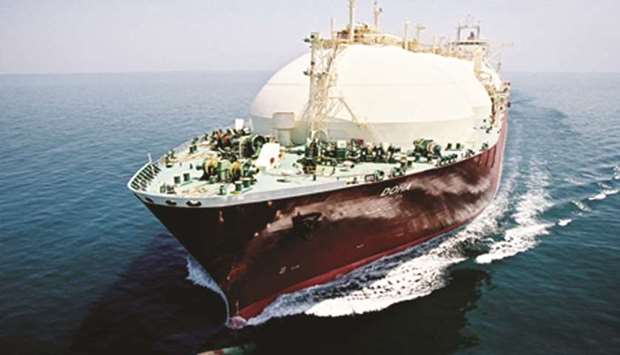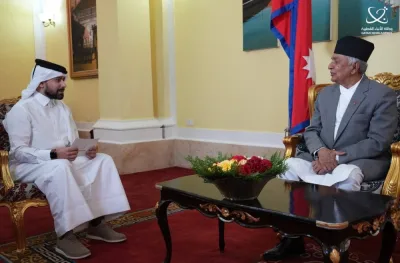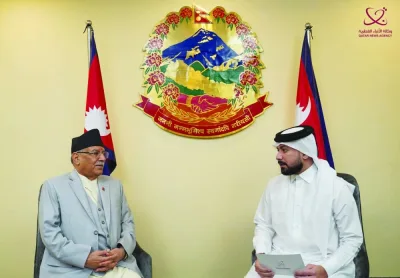Qatar, the world’s biggest seller of liquefied natural gas, can still access shipping routes to deliver oil and gas to buyers after Saudi Arabia and other neighbouring states barred the country from exporting through their territorial waters.
Qatargas told Japan’s Jera Co that it would keep supplying LNG as normal in spite of the Saudi-led severing of diplomatic ties with Qatar, Jera spokesman Atsuo Sawaki said by phone. Jera is Japan’s biggest buyer of Qatari LNG under long-term contracts, according to data compiled by Bloomberg.
The “escalation of tensions” in the Gulf probably won’t disrupt LNG supplies to Qatar’s main customers in Asia, according to Robin Mills, head of Dubai-based consultant Qamar Energy. “Qatar should still be able to export via its own waters and Oman,” Mills said.
Saudi Arabia and three allied Arab countries cut ties with Qatar yesterday. The governments of Saudi Arabia, Bahrain, the UAE and Egypt said in statements they will suspend air and sea travel to and from Qatar.
Qatar exported 79.62mn tonnes of LNG last year, or 30% of global supply, according to the International Group of Liquefied Natural Gas Importers, known by its French acronym GIINGL. State-run Qatar Petroleum, the world’s fourth-largest oil and natural gas producer, has only five Middle Eastern customers for its gas – Kuwait, Oman, Jordan, the UAE and Egypt. LNG exports to these countries comprised about 10% of Qatar’s total shipments in 2016, GIINGL data show.
Qatar, like Saudi Arabia and the UAE, is also a member of the Organisation of Petroleum Exporting Countries. Qatar is the group’s third-smallest producer, pumping 620,000 bpd of crude oil in May, data compiled by Bloomberg show, and ships most of its crude and condensate to Asia.
Aside from sending LNG and oil by ship, Qatar exports natural gas through a pipeline operated by Dolphin Energy, which is owned by Abu Dhabi’s Mubadala Development Co, Total and Occidental Petroleum Corp. The link supplies gas to the UAE and Oman and can send 3.2bn cubic feet per day, though it only uses about two-thirds of that capacity.
Gas continues to flow normally through the Dolphin pipeline to the UAE and Oman, according to two people with knowledge of the matter. There is no sign that supplies will be cut, they said, asking not to be identified.
Qatar Petroleum, Qatar’s LNG producers Qatargas and RasGas, and Dolphin Energy didn’t immediately respond to requests for comment.
For Opec, crisis is just a family squabble
Bloomberg
London/Kuwait City
The diplomatic rift between Qatar and three Arab allies flared regional tensions and caused oil prices to jump. For Opec, it’s likely to remain business as usual.
Saudi Arabia and three other Arab countries severed most diplomatic and economic ties to Qatar yesterday. Although most of the countries involved are members of the Organisation of Petroleum Exporting Countries, the stand-off is seen posing little threat to the group’s initiative to re-balance world oil markets by cutting production.
“It is not the first time for Opec to see a rift between its member countries, and it’s not going to be the last,” said Abdulsamad al-Awadhi, a London-based analyst who was one of Kuwait’s representatives to the group between 1980 and 2001. “Opec has gone through conflicts among its members and this has never had an impact on the flow of work of the organisation or its binding agreements.”
While Opec members have fought political disputes and even wars through the organisation’s 57-year history, their shared economic interests have meant policies on oil production have still been implemented. The group withstood a bitter conflict between Iran and Iraq in the 1980s and Saddam Hussein’s 1990 invasion of Kuwait. Renewed hostility between Saudi Arabia and Iran didn’t prevent last year’s historic agreement to curb production.
Russia, which is cooperating with Opec on supply cuts, doesn’t see tensions in the Gulf having any impact on the deal, the nation’s Vienna-based envoy to international organisations, Vladimir Voronkov, told RIA Novosti. “There are no signs of any disruption to the Opec and non-Opec deal,” said John Sfakianakis, a Riyadh-based director of research at Gulf Research Center. “It is not only in the GCC’s national energy interest but also it is in Russia’s national interest to see the Opec deal sustained as everyone needs higher oil prices and a stable market.”

Qatar, the world’s biggest seller of liquefied natural gas, can still access shipping routes to deliver oil and gas to buyers after Saudi Arabia and other neighbouring states barred the country from exporting through their territorial waters


